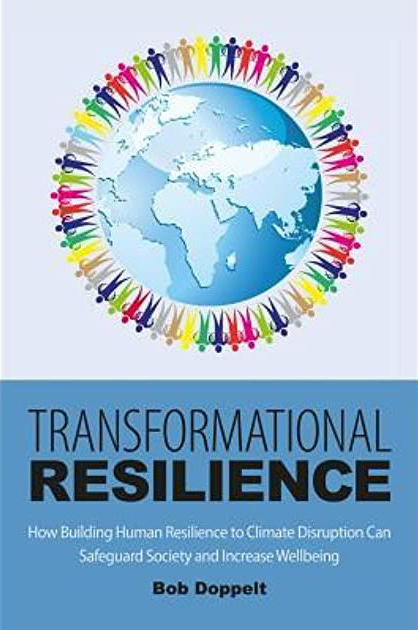How individuals and communities can grow through tough times

This is one of the few books I’ve read on climate change responses that I’d call encouraging and inspiring. Doppelt is an unusual character, who works as both a counselling psychologist and an environmental scientist, combined with socially engaged Buddhism. His book is a good bridge between the global outlook and practical action.
I share Doppelt’s view that we’re now beyond the pattern of major crises followed by periods of normality. Continually rising disruption is more likely, and he argues that the mental wellbeing impacts will be extremely widespread, far beyond the capacity and methods of our mental health services.
What he offers in this book is a very well-researched approach, proven with many clients to cultivate transformational resilience: hopefully before our stress hits trauma levels, but if necessary, after that.
Doppelt says “the psychological definition of trauma is that an experience seriously undermines or completely shatters at least some, if not all, of an individual’s core assumptions and beliefs…climate disruption will produce this type of trauma for many.”
He believes that many individuals, organisations (such as schools, businesses) and communities are already deeply affected by unresolved trauma. However, what he’s advocating is not a massive process of therapy, but skills and processes to enable us to function better in a chaotic world.

His Transformational Resilience approach has two key aspects, and each has three core elements:
Presencing: “the ability to deactivate and direct our psychological drives.”
Ground – and centre yourself by stabilising your nervous system
Remember – your personal strengths, resources, and social support network
Observe – your reactions to and thoughts about the situation non-judgmentally with self-compassion
Purposing: “the capacity to intensify the pull of meaning, direction, and hope in our lives.”
Watch – for new insights and meaning in life and climate-enhanced hardships
Tap – into the values you want to live by in the midst of climate adversity
Harvest – hope for new possibilities by making choices that increase personal, social and environmental wellbeing
The book is designed for practical use: processes to enable these elements are described in detail, with self-help exercises, case studies, and credentials of where they originated, for example mindfulness.
I find this book inspiring because it offers a form of resilience that builds on and expands what I’ve been exploring, which complements Jem Bendell’s Deep Adaptation approach, and which I can imagine being effective for many people. Some adjustment from the USA context where Doppett created this material would be needed.
The final one-third of the book focuses on Transformational Resilience for communities and organisations. The need in communities may already be clear, but my work on resilience with front-line services like the NHS, and with businesses, suggests that many public and private sector bodies are overstretched already, and will need transformational change in the years ahead.
Doppelt’s approaches for communities and organisations are good, but left me feeling that more development and adjustment would be needed for the UK context. The levels of violence, racism, rampant materialism and lots more are severe in the US compared to here, and so are the imminent threats from climate change (major floods, hurricanes etc).
I’m left with a question of how to persuade leaders and members of UK communities and work organisations that the threats we face are major, and justify a major focus of collective attention onto Transformational Resilience at a time when many other demands seem more pressing. This blog is an invitation to anyone interested in exploring this further, and creating a few UK pilot programmes, to contact me.
